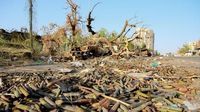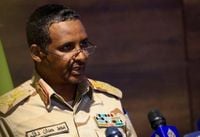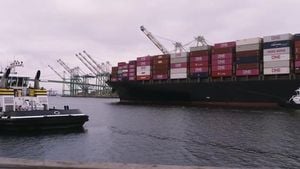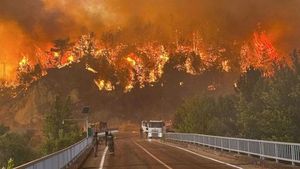Sudan’s already fragile situation took a dramatic turn on Saturday, July 26, 2025, when the paramilitary Rapid Support Forces (RSF) and its allied groups announced the formation of a parallel government. This self-declared administration, led by RSF commander General Mohamed Hamdan Dagalo, marks a significant escalation in the ongoing civil war that has ravaged the country since April 2023.
The RSF-led Sudan Founding Alliance unveiled a 15-member Presidential Council, with Dagalo appointed as its head. Alongside him, rebel leader Abdelaziz al-Hilu, who commands the Sudan People’s Liberation Movement-North (SPLM-N), was named vice president. The coalition also appointed Mohamed Hassan al-Ta’ayshi, a civilian politician and former member of Sudan’s transitional sovereign council from 2019 until the 2021 military coup, as prime minister of what they are calling the “government of peace and unity.”
The announcement was made during a press conference broadcast from Nyala, a city in South Darfur under RSF control, a region that has seen intense fighting and grave human rights abuses. The RSF coalition included political figures, ex-officials, and appointed new regional governors, such as el-Hadi Idris, named governor of Darfur. This move has created a complex situation, as Darfur now has two rival governors: Idris, appointed by the RSF, and Minni Arko Minawi, aligned with the army, who dismissed the RSF’s government as sharing responsibility for crimes committed by their allies.
The RSF’s announcement follows a political charter signed in February 2025 in Nairobi, Kenya, where the group and its allies agreed to establish a rival government. The Kenyan government faced criticism for hosting these talks, with Sudan’s Foreign Ministry condemning the meetings and labeling the RSF’s so-called government a “phantom government” and “illegitimate.”
The internationally recognized government, aligned with the Sudanese Armed Forces (SAF) and led by General Abdel Fattah al-Burhan, controls the north, east, and central parts of Sudan, including the capital Khartoum, which it recently retook from RSF forces. The RSF, meanwhile, holds much of the west, particularly Darfur and parts of Kordofan. This territorial split has entrenched the country’s fragmentation, with the United Nations warning that the formation of a parallel government could deepen divisions and complicate diplomatic efforts aimed at ending the conflict.
The civil war between the RSF and the SAF erupted in April 2023 after tensions between the two factions—once allies who ousted longtime dictator Omar al-Bashir—spiraled into open fighting. The conflict has since devastated Sudan, killing tens of thousands and displacing millions. According to UN and local authorities, over 20,000 people have died, and nearly 14 million have been displaced, though some U.S. university estimates place the death toll as high as 130,000. The war has also triggered a humanitarian crisis, with about half the population facing hunger and famine.
The RSF’s origins trace back to the Janjaweed militias, mobilized under al-Bashir’s regime two decades ago, notorious for atrocities during the Darfur conflict. The RSF itself has been accused of numerous war crimes, including ethnic cleansing and genocide, particularly against the Masalit ethnic group. The Biden administration has sanctioned Dagalo, accusing the RSF and its proxies of genocide, charges the RSF vehemently denies.
In response to the RSF’s parallel government announcement, the Sudanese Armed Forces issued a scathing statement on Sunday, July 27. Brigadier General Nabil Abdullah, the army spokesperson, described the move as a “desperate attempt” to legitimize a “criminal project.” He accused the RSF leadership, particularly Dagalo, of pursuing illegitimate personal ambitions and a racist agenda, further alleging they serve foreign interests beyond their comprehension, using Sudan as a pawn for regional players.
Abdullah called the RSF’s declared government a “pathetic charade” composed of “ignorant figures, collaborators, and war criminals,” warning that these maneuvers aim to obscure their crimes and facilitate foreign interference. Despite these provocations, the SAF reaffirmed its commitment to Sudan’s unity, asserting that the country will remain united thanks to the resilience of its people and support for the national leadership and armed forces.
The Sudanese Foreign Ministry also condemned the RSF’s move, calling it a “complete disregard and contempt for the suffering of the Sudanese people,” who have endured violence and persecution at the hands of the paramilitary group. The ministry urged the international community to avoid engaging with the RSF-led entity, emphasizing that the formation of a “phantom government” is evidence of the RSF’s defeat at the hands of the army.
Experts and analysts warn that the RSF’s creation of a parallel government will only deepen Sudan’s fragmentation. Alan Boswell, Horn of Africa director at the International Crisis Group, remarked that the RSF likely believes this move will increase its legitimacy and leverage, but in reality, it will make the war harder to end and Sudan more difficult to reunify.
Meanwhile, the coalition spokesman, Alaa Eldin Awad Naqd, defended the parallel government’s formation as a commitment to building an inclusive, secular, democratic, and decentralized Sudan. He mentioned six-month emergency plans across all service sectors and strategic plans for the country but declined to provide further details. The coalition announced that the next step would be to form a ministerial cabinet to govern the territories under their control.
Human rights organizations and the United Nations have documented numerous atrocities by both sides, but the RSF’s record is particularly egregious, including allegations of ethnic cleansing and genocide. The city of El Fasher, a key strategic location in Darfur, remains contested, with the army holding it and American officials warning of potential ethnic slaughter should the RSF seize control.
The RSF’s announcement signals an alarming new chapter in Sudan’s protracted conflict, suggesting a prolonged and more complex civil war. The country now faces not only the horrors of ongoing fighting and humanitarian catastrophe but also the prospect of permanent political division akin to the fractured state of neighboring Libya.
As Sudan’s people endure immense suffering, the international community faces a daunting challenge: how to navigate the competing claims to legitimacy, halt the violence, and foster a peaceful resolution that can reunite a deeply divided nation. For now, the RSF’s parallel government stands as a stark symbol of Sudan’s fractured reality and the daunting road ahead.






